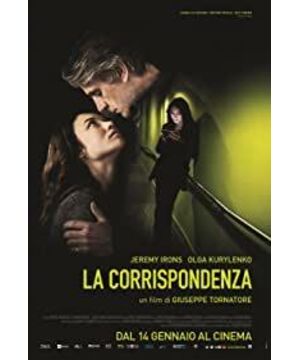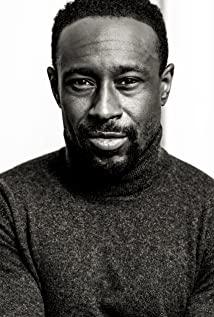The director's hand, as Mr. Zhao Benshan once said, pays attention to the heat. If the heat is not enough, it is difficult to adjust everyone's voice. After the heat is over, things will become too hot. The former happens more often in purely commercial films, and it is commonplace to play tricks on the protagonist or kill important characters for salary reasons. The latter is more likely to happen to directors who want to be writers, which reminds me of the sudden fish hook in You Naihai's "Stalking".
However, after all the above nagging, the director's hand is still invisible in the movie. What we are going to talk about today is a movie about "tangible hand".
Director Tonadore not only retained his habit of forgetting his age (the old and young love in "Paradise Cinema" and the admiration of mature women in "Sicily"), he also turned "director's hand" into this one, intentionally or unintentionally. the theme of the movie.
Since the director himself does not appear in the movie, who is the person who is playing with this hand?
Yes, the professor.
When the audience watches romance movies, what they are looking for is a sense of substitution. What the hero and heroine play in it is actually the position that the audience desires to be in. In short, the hero and heroine represent the audience's perspective. I can actually have sex with such a hot man/woman" The sense of substitution will be stronger.
However, when you open the film, you find that the professor is the first point of view, only the first scene. The skin-to-skin relationship between the professor and Amy was the pinnacle of their intimacy. When the professor wanted to leave the room, Amy's camera was completely blurred, and we could only guess what the professor was thinking in the dark. After an empty shot, the professor leaves the hotel and completes his audience view section. After that, all his psychological plays or one-man plays can only be shown indirectly in the video, and Amy has become the only representative of the audience's perspective.
When people are watching a movie and immersing themselves in a situation, suddenly there is an obvious artificially designed situation, which inevitably makes people feel less interested. The difference in "Correspondence" is that it is a story about a human-designed situation. Before Amy learned of the professor's death, the editing was still relatively broken, and Amy's daily life was swept away like a quick glance. The audience (like Amy) pays more attention to the stars-related messages from the professor and the reasons why the professor doesn't answer the phone than usual. However, the director's hand has already laid a foreshadowing in this scene.
Just after the news of the professor's death came out, "Director's Hand" slowly surfaced. Amy has since become a VIP audience of the three-month-long cold and warm drama directed by the professor.
Following Amy's point of view, we are not only willing to be led by the professor (or director), but also want to know what will happen sooner. When Amy played a small temper, the director's hand took effect for the first time: the postman delivered a gift. When Amy was nervously preparing for the exam, the director's hand came into effect for the second time: the professor calculated all the points including the time, place, subject, etc., and even the examiner could count the questions clearly, filling Amy up. The heroine's halo. When Amy couldn't forgive herself, chose to escape, and even cut off the communication with the professor, the director's hand came into effect for the third time: the professor's "11 me" theory, just like the headmaster Dumbledore in "Harry Potter" Just like the lighter left to Ron, tell Amy: "I didn't know you would go, but I knew you would come back." When Amy failed to find the professor's information and encountered a bottleneck, the director's hand came into effect: yes The postman, passer-by A, passer-by B, lawyer, doctor, professor's family, passer-by (under the professor's instruction or through words and deeds) shared the professor's CDs, letters and the professor's mental journey to her, and let the professor guide her in the future direction. In this play directed by the professor, Amy is her VIP audience, and she feels the emotional ups and downs brought by the director with the audience in the movie; the lawyer and the doctor are the main creators, explaining the professor's mental process and bringing different viewpoints for For everyone's reference (the doctor's objection to the professor shows that the director also has his own concerns about the story itself), passers-by A, B, C, and Ding are the extras in the play, conscientiously completing the task assigned by the director, and never asking why. Even if the director was not on set, the film was ultimately fruitful thanks to his strict director's hand and the careful observance of the main actors.
Of course, this achievement is not the box office. This three-month film not only extended the length of Professor's life, but also increased the thickness of Amy's life. She is no longer emotionally unstable, longing for death, and caring for herself. She has become an excellent graduate, plucked up the courage to "repeat" the stunt of the car accident, reached a reconciliation with her mother, and more importantly, after he left, she can also be herself Live well.
When we watch a movie and feel that a hand is forcing a change of direction, we are generally disappointed. However, in "Correspondence", "the director's hand" has become the theme, the director is the professor, and the audience is Amy. Every surprise of the director (the professor's meticulous preparation) can make the audience (Amy) feel the same and moved in a mess. On the contrary, it makes the passer-by C and the doctor's sentence "I can't think of anyone who loves you like him" to the heroine. Extraordinarily pale. The professor's play seems to exude a perfect atmosphere from the inside out.
However, despite all the calculations, what really touches people is often inadvertently. The scene that moved me the most in the whole film is precisely from the SIM card picked up by the boatman Ottavia of Borgoventoso. The professor is afraid of not doing well and becomes angry, flustered and even bleeding. This part is also not within the scope of the professor's calculation.
Perhaps, the sculptor at the end of the credits is right: "This sculpture is actually the previous model. We wanted to replace it because we cried out and broke it up. As a result, we replaced it with a perfect work, but there was no more. That feeling."
I'm afraid the same is true of this love movie, the feeling that everything is under control is not as shocking as the regret of leaving with regrets. This is what Tonadore and the professor's hands can't even calculate.
The director's hand, it's better to be more restrained. The same is true of people, love is not life-and-death and heart-breaking, but a long stream of water. The love in the movie is really touching, but the delicate little love, isn't it love?
View more about Correspondence reviews











